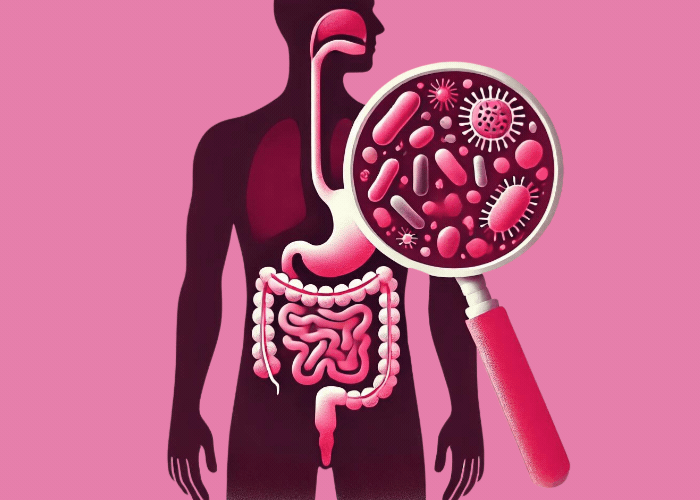Need some quick tips on how to avoid an upset stomach on holiday? We have summarised all our tips listed below:

Pathogens put a massive strain on the digestive system when travelling. This can have far-reaching consequences such as constipation, bloating or traveller’s diarrhoea. Diarrhoea is defined as three or more loose stools per day accompanied by other symptoms affecting the gastrointestinal tract. Many holidaymakers travelling abroad are afflicted by “Bali belly” and spend several days not relaxing on the beach but on the toilet.
Upset stomach on holiday?
Around 70% of traveller’s diarrhoea is caused by the so-called enterotoxin-producing strains of Escherichia coli, also known as ETEC bacteria. They unfold their damaging effect directly in the gastrointestinal tract by means of toxins. However, infections with these ETEC strains are usually self-limiting, meaning the body excretes the pathogenic germs and their toxins through diarrhoea.
Far more serious problems are caused by salmonella, shigella, listeria and various types of campylobacter. Although these are only responsible for around 20% of traveller’s diarrhoea, they directly infect the intestinal mucosa, damage it and can then spread to other organs via the bloodstream.

Persistent diarrhoea?
Around 10% of people who suffer from traveller’s diarrhoea continue to have severe gastrointestinal problems long after returning from their holiday destination: In addition to recurring, sometimes explosive diarrhoea, post-infectious irritable bowel syndrome or chronic inflammatory bowel disease (e.g. ulcerative colitis or Crohn’s disease) can also occur as a result.
How to avoid an upset stomach on holiday
It makes sense not to wait and see if the traveller’s diarrhoea “strikes” and then treat it, but to take a prophylactic approach. In addition to hygiene measures (only eat cooked or peelable food, drinks only from bottles, etc.), it is particularly advisable to take probiotics in good time – i.e. at the beginning of the journey or even a few days beforehand.
Due to regional differences in the harmful germs that can cause traveller’s diarrhoea, a preparation containing several probiotic bacterial strains is preferable to a single bacterial strain: different positive microorganism species can also fight different bad germs. In addition, the large number of probiotic bacteria also increases the chances that they will colonise the human intestine in the long term and adhere to the intestinal mucosa to protect against pathogenic species and strengthen it.
Study confirms: Multispecies probiotic prevents traveller's diarrhoea and reduces symptoms
A synbiotic (combination of probiotic and prebiotic) specially developed for long-distance travellers with 7 scientifically tested bacterial strains and a specially coordinated prebiotic combination was tested in an observational study to determine its ability to prevent the occurrence of traveller’s diarrhoea and also to reduce existing gastrointestinal symptoms.
Numerous test subjects spent their holidays in high-risk countries (with more than 50% probability of developing traveller’s diarrhoea) and only 12% of probiotic users showed symptoms of traveller’s diarrhoea.
In Egypt, the country with the highest probability of traveller’s diarrhoea (≥ 80%), over 90% of travellers were even protected by the multispecies probiotic. In addition, existing gastrointestinal complaints (constipation, flatulence and diarrhoea) improved in 95% of those affected.
The key success factors of this modern, scientifically tested synbiotic are the precise selection of bacterial strains (lactobacilli, lactococci and bifidobacteria) and their harmonisation with each other, as well as the shelf life at up to 40 degrees Celsius (which is not the case with most simple probiotic products).
The results of the study clearly show that the preventive intake of medically relevant probiotics when travelling is clearly recommended – especially to avoid complications such as functional bowel disease.
- Be aware of germs!
Our intestines often react to this with constipation, bloating and, in the worst case, traveller’s diarrhoea. Up to 70 % suffer from painful bowel movements in addition to diarrhoea.
- Cause of traveller's diarrhoea
By far the most common triggers of traveller’s diarrhoea are so-called enterotoxin-producing strains of Escherichia coli, also known as ETEC bacteria. The body excretes these pathogenic germs and their toxins after a certain time with the diarrhoea. Far more serious problems are caused by salmonella, shigella, listeria and various types of campylobacter.
- Persistent diarrhoea after a holiday?
Around 10% of people who suffer from traveller’s diarrhoea continue to have severe gastrointestinal problems long after returning from their holiday destination: In addition to recurring, sometimes explosive diarrhoea, post-infectious irritable bowel syndrome or chronic inflammatory bowel disease can also occur as a result.
- Probiotics for travelling
A study shows that over 80 % of participants who took a multispecies probiotic did not develop traveller’s diarrhoea during their holiday, even though some of them were travelling in high-risk countries (with more than 50 % probability of developing traveller’s diarrhoea).



























